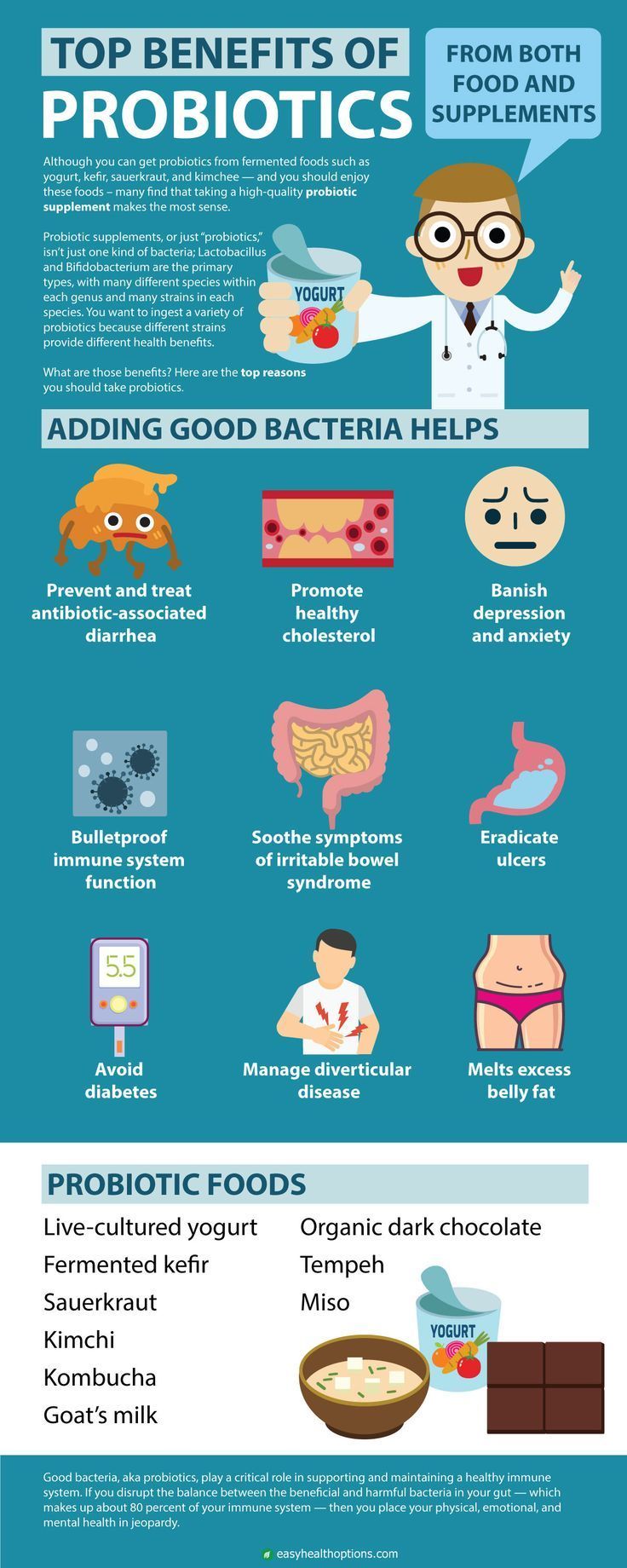Probiotics for digestive health have gained significant attention in recent years, as more people become aware of their importance and benefits. These beneficial bacteria can play a pivotal role in maintaining a balanced gut microbiome, which is essential for overall well-being. In this article, we’ll delve deeper into probiotics, exploring what they are, how they work, and their impact on our digestive health.
Understanding Probiotics: What Are They?

Before we delve into the benefits of probiotics for digestive health, it’s crucial to understand what probiotics are and how they work within our bodies.
Read more: Probiotics: What They Are, Benefits, and Side Effects
The Definition of Probiotics
Probiotics are live microorganisms, primarily bacteriaand yeasts, that provide numerous health benefits when consumed in adequate amounts. Commonly referred to as “good” or “friendly” bacteria, these organisms help maintain the balance of our gut microbiota, which consists of trillions of microbes that reside in our gastrointestinal tract.
The term “probiotic” comes from the Latin word “pro,” meaning “for,” and the Greek word “bios,” meaning “life.” This etymology emphasizes the positive impact these microorganisms have on our health.
How Probiotics Work
Probiotics work by:
- Restoring the natural balance of gut bacteria: When harmful bacteria outnumber beneficial bacteria, it can lead to various digestive problems, such as diarrhea, constipation, and bloating. Probiotics help restore this balance.
- Producing beneficial substances: Probiotics produce short-chain fatty acids and other metabolites that support gut health and improve digestion.
- Enhancing the immune response: Probiotics play a vital role in strengthening the immune system, which helps fight infections and inflammation in the gut.
Types of Probiotics
There are several different strains of probiotics, each with unique properties and benefits. Some of the most common strains include:
- Lactobacillus: Found in yogurt and fermented foods, Lactobacillus aids in lactose digestion and supports gastrointestinal health.
- Bifidobacterium: This strain resides predominantly in the colon and helps relieve symptoms of irritable bowel syndrome (IBS) and constipation.
- Saccharomyces boulardii: A beneficial yeast that may help prevent antibiotic-associated diarrhea and aid in recovery from gastrointestinal infections.
Understanding these types of probiotics is essential to selecting the right one for your needs.
The Benefits of Probiotics for Digestive Health
Exploring the benefits of probiotics for digestive health reveals how they contribute to overall well-being and vitality.
Improving Gut Health
One of the main functions of probiotics is to improve gut health. By promoting a balanced gut microbiome, they can help alleviate a number of digestive issues. This includes:
- Reducing Irritable Bowel Syndrome (IBS) Symptoms: Probiotics can significantly reduce the severity and frequency of IBS symptoms, including abdominal pain, bloating, and irregular bowel movements.
- Preventing and Treating Diarrhea: Probiotics, particularly Saccharomyces boulardii, have been shown to be effective in preventing and treating antibiotic-associated diarrhea and infectious diarrhea.
- Supporting Gut Barrier Function: Healthy gut bacteria strengthen the intestinal lining, preventing harmful pathogens and toxins from entering the bloodstream.
Relieving Digestive Disorders
Beyond improving gut health, probiotics may also play a role in relieving various digestive disorders. Some benefits include:
- Relieving Constipation: Certain probiotic strains may improve bowel movements.Intestinal nutrient flexibility, resulting in more regular bowel movements and less straining during bowel movements.
- Managing inflammatory bowel disease (IBD): Research suggests that probiotics may help mitigate the symptoms and inflammation associated with IBD conditions such as Crohn’s disease and ulcerative colitis.
- Relieving bloating and gas: Probiotics may help break down food particles and ferment fiber, reducing gas production and bloating.
Improving Nutrient Absorption
An often overlooked benefit of probiotics for digestive health is their ability to improve nutrient absorption. They do this by:
- Breakdown of complex carbohydrates: Probiotics help digest complex carbohydrates and fiber, making nutrients more bioavailable to the body.
- Vitamin synthesis: Certain probiotics can synthesize vital vitamins, such as vitamin K and some B vitamins, which contribute to overall nutritional status.
- Supporting mineral absorption: Probiotics can increase the absorption of essential minerals such as calcium, magnesium, and iron, further supporting health.
The Role of Dietary Fiber and Probiotics
Although probiotics are vital, they work best in synergy with dietary fiber. By consuming fiber-rich foods, you can nourish beneficial gut bacteria and improve their effectiveness. Some high-fiber foods include:
- Whole grains
- Fruits and vegetables
- Legumes
- Nuts and seeds
Combining probiotics with high-fiber foods can create a healthy environment in the gut, promoting optimal digestive health.
Incorporating Probiotics into Your Diet

Integrating probiotics into your diet can be a simple and delicious process. Here are some guidelines and options to consider.
Food Sources of Probiotics
Several food sources are naturally rich in probiotics. Incorporating them into your daily meals can help you reap the benefits of probiotics for digestive health. Some popular options include:
- Yogurt: One of the best-known sources of probiotics, yogurt is full of live cultures that support gut health. Look for labels that indicate “live active cultures.”
- Kefir: This fermented medicinal beverage is even richer in probiotics than yogurt, providing multiple strains of beneficial bacteria.
- Sauerkraut and Kimchi: Fermented cabbage dishes like sauerkraut and kimchi are excellent sources of probiotics and add tangy flavors to your meals.
- Miso: A traditional Japanese fermented soybean paste used in soups and sauces, miso contains a variety of beneficial bacteria.
Probiotic Supplements
For people who may not be getting enough probiotics through their diet, probiotic supplements may be an alternative solution. However, it is essential to choose high-quality products that contain specific strains known to confer health benefits. Here are some considerations:
- Check the CFU count: Look for supplements that contain billions of colony-forming units (CFUs) to ensure potency.
- Choose multi-strain formulas: Different probiotic strains offer various benefits; a multi-strain supplement may provide a broader range of effects.
- Consult with a healthcare professional: Before starting any new supplement, consult with a healthcare provider to determine the right strain and dosage for your needs.
Tips to Maximize the Benefits of Probiotics
To maximize the benefits of probiotics, consider the following tips:
- Combine probiotics with prebiotics: Prebiotics are non-digestible fibers that feed friendly bacteria. Foods high in prebiotics include garlic, onions, bananas, and asparagus.
- Maintain variety: Ensure a diverse range of probiotic strains for comprehensive gut health benefits. This can be achieved by rotating different probiotic foods in your diet.
- Be consistent: Regular probiotic consumption is key to building and maintaining a healthy gut microbiome.
Frequently Asked Questions About Probiotics for Digestive Health

What are the main benefits of probiotics for digestive health?
Probiotics support digestive health by restoring intestinal balance, relieving symptoms of digestive disorders, improving nutrient absorption, and improving overall intestinal health.
Can probiotics help with weight management?
Research suggests that probiotics may play a role in weight management by promoting a healthy metabolism, regulating appetite, and improving fat storage. However, results may vary based on individual differences.
Are there any side effects associated with taking probiotics?
Most people tolerate probiotics well, but some may experience mild side effects, such as gas or bloating. It is advisable to start with lower doses and gradually increase intake to assess tolerance.
How long does it take to see improvements with probiotics?
Improvements may vary depending on individual circumstances, but many People notice positive changes within a few days to weeks of consistent probiotic use.
Should I take probiotics if I’m taking antibiotics?
Yes, taking probiotics during and after a course of antibiotics can help replenish beneficial gut bacteria and reduce the risk of antibiotic-associated diarrhea. Always consult with a healthcare professional before starting any probiotic alongside medication.
Conclusion
In conclusion, probiotics for digestive health are a powerful tool for improving gut health and overall well-being. By understanding the benefits, incorporating probiotics into your diet, and considering the right strains and sources, you can take proactive steps toward achieving optimal digestive health. Whether through food sources or supplements, embracing probiotics can pave the way for a healthier, happier gut and a healthier lifestyle. prosperous life.


